

Onomatopoeia - Examples and Definition of Onomatopoeia. Onomatopoeia Definition Onomatopoeia is defined as a word, which imitates the natural sounds of a thing.
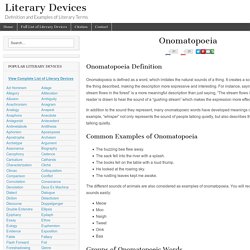
It creates a sound effect that mimics the thing described, making the description more expressive and interesting. For instance, saying, “The gushing stream flows in the forest” is a more meaningful description than just saying, “The stream flows in the forest.” The reader is drawn to hear the sound of a “gushing stream” which makes the expression more effective. In addition to the sound they represent, many onomatopoeic words have developed meanings of their own. Τέχνιχ. Consistency. Consistency means: "the property of holding together and retaining shape.
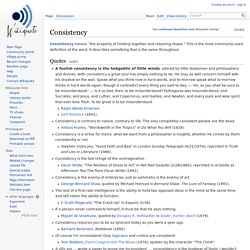
" This is the most commonly-used definition of the word. It describes something that is the same throughout. Quotes[edit] Consistency is contrary to nature, contrary to life. The only completely consistent people are the dead. Hoyt's New Cyclopedia Of Practical Quotations[edit] Quotes reported in Hoyt's New Cyclopedia Of Practical Quotations (1922), p. 132. Of right and wrong he taught Truths as refin'd as ever Athens heard; And (strange to tell) he practis'd what he preach'd. External links[edit] Ἰδιούμαι. Irony - Examples and Definition of Irony. Irony Definition Irony is a figure of speech in which words are used in such a way that their intended meaning is different from the actual meaning of the words.
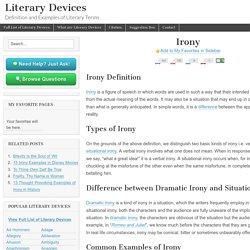
It may also be a situation that may end up in quite a different way than what is generally anticipated. In simple words, it is a difference between the appearance and the reality. Types of Irony On the grounds of the above definition, we distinguish two basic kinds of irony i.e. verbal irony and situational irony. Difference between Dramatic Irony and Situational Irony.
Interrobang. The interrobang, also known as the interabang[1] (informally known as quexclamation mark), /ɪnˈtɛrəbæŋ/, ‽ (often represented by ?!
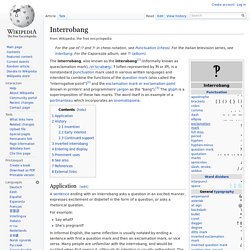
Or !?) , is a nonstandard punctuation mark used in various written languages and intended to combine the functions of the question mark (also called the "interrogative point")[2] and the exclamation mark or exclamation point (known in printers' and programmers' jargon as the "bang").[3] The glyph is a superimposition of these two marks. The word itself is an example of a portmanteau which incorporates an onomatopoeia. Application[edit] For example: Say what‽She's pregnant‽ In informal English, the same inflection is usually notated by ending a sentence with first a question mark and then an exclamation mark, or vice versa.
In Spanish, the question mark must be paired up with an inverted question mark; likewise, the interrobang must be paired up with an inverted interrobang (⸘, U+2E18). List of forms of word play. This is a list of techniques used in word play with Wikipedia articles.
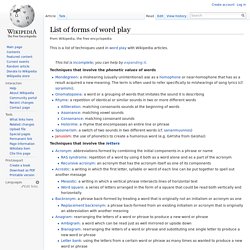
Techniques that involve the phonetic values of words Mondegreen: a mishearing (usually unintentional) ase as a homophone or near-homophone that has as a result acquired a new meaning. The term is often used to refer specifically to mishearings of song lyrics (cf. soramimi).Onomatopoeia: a word or a grouping of words that imitates the sound it is describingRhyme: a repetition of identical or similar sounds in two or more different words Alliteration: matching consonants sounds at the beginning of wordsAssonance: matching vowel soundsConsonance: matching consonant soundsHolorime: a rhyme that encompasses an entire line or phraseSpoonerism: a switch of two sounds in two different words (cf. sananmuunnos)Janusism: the use of phonetics to create a humorous word (e.g.
GAYsha from Geisha)) Cheerfulness, Gratitude, Thankfulness, Joyfulness: Quotations, Sayings, Wisdom, Poetry, Aphorisms, Virtues. Compiled by Michael P.
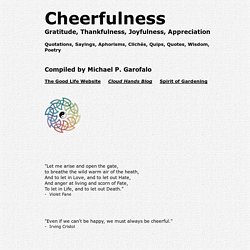
Garofalo The Good Life Website Cloud Hands Blog Spirit of Gardening "Let me arise and open the gate, to breathe the wild warm air of the heath, And to let in Love, and to let out Hate, And anger at living and scorn of Fate, To let in Life, and to let out Death. "- Violet Fane "Even if we can't be happy, we must always be cheerful "Keep a green tree in your heart and perhaps a singing bird will come "Those who bring sunshine to the lives of others cannot keep it from themselves "Let us be grateful to people who make us happy; they are the charming gardeners who make our souls blossom. " - Marcel Proust "A man has to live with himself, and he should see to it that he always has good company "He is a wise man who does not grieve for the things which he has not, but rejoices for those which he has. Plume. EDUCATION. Ironic Online Etymology Dictionary.
Ironic (adj.) 1620s, from Late Latin ironicus, from Greek eironikos "dissembling, putting on a feigned ignorance," from eironeia (see irony).
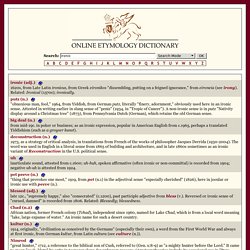
Related: Ironical (1570s); ironically. putz (n.) "obnoxious man, fool," 1964, from Yiddish, from German putz, literally "finery, adornment," obviously used here in an ironic sense. Inspirational Quotes. Sardonic. Slanguage. Essayer. Rhapsodos. Poiemaeia.